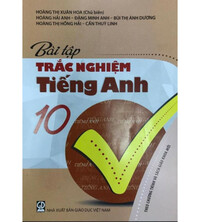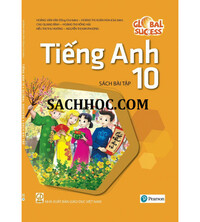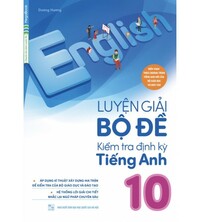Đề số 1 - Đề kiểm tra học kì 1 - Tiếng Anh 10 mới
Đáp án và lời giải chi tiết Đề kiểm tra học kì 1 - Đề số 1 - Tiếng Anh 10 mới
Đề bài
I. LISTENING:
Listen to the conversation and do the exercises to practise and improve your listening skills.
Are the sentences true or false?
Band auditions
Question 1. The boy wants to be in the band.
Question 2. He doesn't like singing.
Question 3. He can't remember the song on the guitar.
Question 4. The boy is good at the drums.
Question 5. The girl says she will call him the next day.
Listen to the radio interview about boy bands and do the exercises to practise and improve your listening skills.
Choose the correct option to complete the sentences.
Boy bands
Question 6. The most important thing for boy bands in the past was that _________
A. they had some musical ability
B. they could dance well
C. they had different personalities
Question 7. Things have changed because ________
A. people wanted something different
B. the media and new technology influence things differently
C. both of the above
Question 8. Starting on a reality show like X Factor is great for a band because _________
A. appearing on TV is the quickest way to get famous
B. the many viewers who vote every week become loyal fans
C. people feel a personal connection with bands they see on TV
Question 9. The words to One Direction songs are designed to _______
A. make teenage girls feel good about themselves
B. appeal to mums by being a bit cheeky
C. communicate universal messages about love
Question 10. One Direction's clothes _________
A. are very individual and they each have a strong look
B. create a clean-cut, safe and non-threatening image
D. are casual and fashionable with a touch of rebelliousness
II. PHONETICS - VOCABULARY - LANGUAGE FOCUS
Choose the word which has the underlined part pronounced differently from the rest.
Question 11.
A. lung B. nurture
C. muscle D. brush
Question 12.
A. different B. critical
C. intestine D. dining table
Choose the word whose main stressed syllable is different from the rest.
Question 13.
A. nervous B. prevent
C. healthy D. system
Question 14.
A. grocery B. memory
C. incredible D. balance
Choose A, B, C, or D that best completes each unfinished sentence.
Question 15. People tend to live in…………family which consist of parents and children.
A. blended B. nuclear
C. extended D. single-parent
Question 16. “Who……………..?” “…………………to get through to Misaki”
A. do you phone/ I’m trying
B. are you phoning/ I’m trying
C. are you phoning/ I try
D. do you phone/ / I try
Question 17. I ……………….one of my special desserts for dinner, if you like.
A. make B. am going to make
C. will make D. am making
Question 18. The next train to Dublin …………. at 4:45. ( station announcement)
A. will leave B. is leaving
C. is going to to leave D. leaves
Question 19. Mark is _________ with the volunteer work in this charity organization. He is not very ________ about getting a paid job next time.
A. disappointed/ hopeful
B. disappointed/ hopeless
C. disappointing/ hopefulness
D. disappointing/ hopes
Question 20. It is__________that controls all the organs in the body.
A. heart B. brain
C. spine D. nerves
Question 21. __________takes place when the female provides the main source of income for the family
A. Breadwinner Mom
B. Breadwinner Dad
C. Breadwinner
D. Breadwinner male
Question 22. The ____________system is to process the nutrients absorbed from the small intestine.
A. Respiratory B. Circulatory
C. Digestive D. Skeletal
Question 23. Students should have their eyes ____________ regularly.
A. tested B. to test
C. test D. testing
Error identification.
Question 24. Roles (A) in homemaking (B) and breadwinning can share (C) by family members (D).
Question 25. It didn’t take (A) her much (B) time to do (C) the laundry because (D) she has a washing machine.
Question 26. I shall contact (A) you as soon as (B) they will phone (C) me (D).
Question 27. Our (A) new neighbour (B) is (C) a bored (D) man.
III. READING
Read the passage and choose the best answer:
FOOD AROUND THE WORLD
It isn't amazing how much time we spend talking about food? "Have you ever eaten ...?", "What do you have for lunch?" and so on. And yet, when you travel from one county to another, you find that people have quite different feelings about food. People often feel that what they eat is normal, and what other people eat is strange and silly. In most parts of Asia, for example, no meal is complete without rice. In England, people eat potatoes every day. In the Middle East, bread is the main part of every meal. Eating becomes a habit which is difficult to change. Americans like to drink a lot of orange juice and coffee. The English drink tea four or five times a day. Australians drink large amounts of beer and the French drink wine every day.
The sorts of meat people like to eat also differ from one country to another. Horse meat is thought to be delicious in France. In Hong Kong, some people enjoy eating snakes. New Zealanders eat sheep, but never eat goat meat. The Japanese don’t like to eat sheep meat because of its smell, but they enjoy eating raw fish. So it seems that although eating is a topic that we can talk about for hours, there is a little common sense in what we say about it. People everywhere enjoy what they have always eaten, and there is very little we can do to change our eating habit.
Question 28. What is the main idea of the text?
A. People have the same feelings about food.
B. People think about food differently.
C. People think that no meal is perfect without rice.
Question 29. According to the writer, where is bread the main food?
A. In Asia
B. In Japan
C. In Middle East
Question 30. Which of these people drink wine every day?
A. Americans
B. Australians
C. The French
Question 31. Why are the Japanese not interested in sheep meat?
A. They don't like its smell.
B. It tastes bad.
C. Horse meat and goat meat are popular.
Question 32. In which country do people often drink beer?
A. France
B. Australia
C. England
Question 33. Which is popular food in Japan?
A. Fish
B. Horse meat
C. Goat meat
Question 34. How does the writer conclude about our eating habit?
A. Our eating habit is difficult to change.
B. People everywhere enjoy eating new food.
C. We can change our eating habit easily.
IV. WRITING
Rewrite the following sentences using the words given so that it means exactly the same as the first sentence.
Question 35. The gardener waters the flowers every evening.
⟹ The flowers _________________
Question 36. My nephew often flied a kite in this field when he was a child.
⟹ My nephew used _______________
Question 37. I last saw my cousin two years ago.
⟹ I haven’t ________________
Question 38. It is believed that the wanted man is living in New York.
⟹ The wanted man ________________
Question 39. Her boyfriend forgot to take her to the movie theatre.
⟹ Her boyfriend didn’t remember _________________
Question 40. He sang Sarah the whole song many times.
⟹ Sarah listened him ________________
Lời giải chi tiết
| Question 1 | T | Question 21 | A |
| Question 2 | F | Question 22 | C |
| Question 3 | T | Question 23 | A |
| Question 4 | F | Question 24 | C |
| Question 5 | F | Question 25 | A |
| Question 6 | C | Question 26 | C |
| Question 7 | C | Question 27 | D |
| Question 8 | B | Question 28 | B |
| Question 9 | A | Question 29 | C |
| Question 10 | B | Question 30 | C |
| Question 11 | B | Question 31 | A |
| Question 12 | D | Question 32 | B |
| Question 13 | B | Question 33 | A |
| Question 14 | C | Question 34 | A |
| Question 15 | B | Question 35 | |
| Question 16 | B | Question 36 | |
| Question 17 | C | Question 37 | |
| Question 18 | D | Question 38 | |
| Question 19 | A | Question 39 | |
| Question 20 | B | Question 40 |
Search google: "từ khóa + timdapan.com" Ví dụ: "Đề số 1 - Đề kiểm tra học kì 1 - Tiếng Anh 10 mới timdapan.com"







